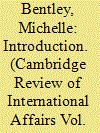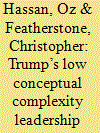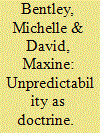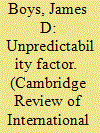|
|
|
Sort Order |
|
|
|
Items / Page
|
|
|
|
|
|
|
| Srl | Item |
| 1 |
ID:
179798


|
|
|
|
|
| Summary/Abstract |
This article introduces the special issue on Trump and unpredictability in international relations. It analyses each of the contributions to the special issue in turn, as they appear in the running order, while also elaborating on the intellectual and political context for the special issue as a whole. Paralleling the special issue, this introduction begins by setting out the problem of understanding the very notion of unpredictability itself as a general concept; turns to unpacking that theoretical complexity in more empirical terms by questioning how we can understand unpredictability in relation to Trump’s foreign policy; explores the contestation of that understanding by analysing alternative explanations for unpredictability and whether this constitutes doctrine; then delves more deeply into the specific notion of Madman theory, which comprises a critical and highly prominent sub-section of the unpredictability debate; and culminates in a more expansive focus on the impact of unpredictability as Trump’s foreign policy approach, specifically in relation to China.
|
|
|
|
|
|
|
|
|
|
|
|
|
|
|
|
| 2 |
ID:
179803


|
|
|
|
|
| Summary/Abstract |
It is often noted that former US President Donald Trump brought unpredictability to Washington’s relationship with China. This may appear intuitively true, but in what ways was Trump actually ‘unpredictable’ towards China? We show that the most unpredictable feature of Trump’s approach was his rhetoric, strongly defined by impulsivity, emotion and provocation. This generated rhetorical unpredictability which was regularly seen in inconsistent and contradictory statements. Using political psychology and leadership personality approaches, we further demonstrate that this unpredictable rhetoric can be traced to Trump’s psychological profile. We argue that while the composition of Trump’s China rhetoric was often difficult to anticipate, as a component of his US China policy it was predictable to the extent that it was grounded in his personality. Trumpian China policy broadly followed longer-term trends, but the president’s erratic rhetoric had domestic and international consequences for the relationship. The article further contributes to work on unpredictability in international relations (IR), and on leadership personalities and foreign policy.
|
|
|
|
|
|
|
|
|
|
|
|
|
|
|
|
| 3 |
ID:
179799


|
|
|
|
|
| Summary/Abstract |
On the campaign trail, then-candidate Donald Trump expressed a desire to pioneer an unpredictable US foreign policy that would both deceive opponents and disrupt the status quo. Academic and media commentators readily labelled this Trump’s ‘Unpredictability Doctrine’ and have since debated its merits and demerits. Beyond inevitable partisan divides, however, these responses also revealed enormous disagreement over conceptualizations of unpredictability and its impacts, raising fundamental questions for the IR discipline and the foreign policy analysis it informs. What are the ontological and epistemological roots of unpredictability in international politics? How can scholars simultaneously grapple with the conundrums posed by erratic actors and the larger, ever-changing systems they shape? This article unravels the philosophy of science (PoS) issues inherent in theorizing unpredictability, offering a novel, synthesized typology. Recognizing that PoS assumptions both frame accounts of unpredictability and represent a source of uncertainty, this article instead advocates epistemological humility, offering a new typology that transcends assumptions and facilitates dialogue between camps. This typology includes three ‘buckets’ of unpredictability – risk, uncertainty and complexity – that can be interpreted according to varying philosophy of science traditions. When applied empirically, this terminology helps contextualize analysis and expose oftentimes overlooked contours of US foreign policymaking.
|
|
|
|
|
|
|
|
|
|
|
|
|
|
|
|
| 4 |
ID:
179801


|
|
|
|
|
| Summary/Abstract |
This article argues that the Trump administration was not guided by an unpredictability doctrine, but was unpredictable because of the President's low conceptual complexity leadership style. This conclusion is derived by using grounded theory and utilising computer-assisted qualitative data analysis software. We demonstrate that the notion of an unpredictability doctrine was introduced exclusively within the 2015–2016 Republican primary season to avoid accountability; especially in the realm of foreign policy. The notion of being unpredictable served an important political function, but was not part of a doctrine nor conviction in any meaningful sense. As a result, there was no commitment to an unpredictability doctrine throughout President Trump's time in office, except as a persistent myth broadcast by the various media outlets. We show that the notion of unpredictability and low complexity leadership was most evident with regards to the Trump administration’s confrontation with the Islamic State. Whereby Trump’s early evasion of accountability, and lack of a plan, was justified with appeals of needing to act secretly. Our analysis shows that Trump’s unpredictability was not intentional, but was rather a by-product of low conceptual complexity informing the formulation of policy.
|
|
|
|
|
|
|
|
|
|
|
|
|
|
|
|
| 5 |
ID:
179800


|
|
|
|
|
| Summary/Abstract |
This article tackles the question of whether US President Donald Trump’s foreign policy is informed by doctrine and, if so, what that doctrine is. In doing so, it positions itself with those who argue for the presence of a doctrine and specifically those who argue for a doctrine of unpredictability. The article problematises current understandings of doctrine, and the notion of unpredictability itself. The tendency to rely on the rational decision-making model is identified as a hindrance to analysis that acknowledges the possibility of a doctrine premised on a deliberate strategy of obfuscation and of wrongfooting both friend and foe. A four-pronged model of unpredictability is posited, consisting of inconstancy, inconsistency, unconstrainedness, and unreliability. This model encourages research unimpeded by prior ideas that treat Western foreign policy as rational and therefore expands the range of possible foreign policy doctrines that analysts contemplate.
|
|
|
|
|
|
|
|
|
|
|
|
|
|
|
|
| 6 |
ID:
179802


|
|
|
|
|
| Summary/Abstract |
Five decades before Donald Trump sought to make a virtue out of his unpredictable approach to policy, Richard Nixon adopted a similar stance in regard to foreign affairs that became known as The Madman Theory. The Nixon-Trump comparison in regard to foreign policy and their embrace of a high-risk approach to international negotiations once in office, follows striking parallels between the two men’s campaign pledges in 1968 and 2016. This paper examines the Madman Theory to consider its implementation by the Nixon administration and its subsequent adoption by the Trump White House as both leaders sought to rationalize their unpredictable approach to international flashpoints. Through a consideration of speeches, statements, transcripts and tweets it is possible to discern the manner in which both presidents embraced this approach to international relations, and the extent to which it served their interests as President of the United States.
|
|
|
|
|
|
|
|
|
|
|
|
|
|
|
|
|
|
|
|
|